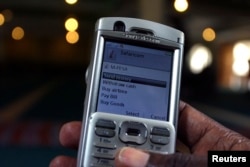Multinational high-tech companies looking for new frontiers and fresh ideas are lining up for a slice of Africa’s relatively untapped consumer market.
Many experts are saying the continent is poised to be the next hotbed of technological innovation. Others are even more optimistic.
“Africa is that frontier right now,” said Canada-based New Media marketing strategist Douglas Idugboe. And it is the place where “a lot of technology innovation” is taking place, added Mark Walker, a research director at IDC Middle East, Turkey and Africa.
“In Africa, the consumers are using technology in new and creative ways,” Walker said. “The most obvious ones are the ones that relate to … payment mechanisms, or transfer of information or just basic human communication.”
Walker said technology development in Africa is the opposite of conventional markets, where innovation has come to be considered more of an improvement on existing products, and less of a breakthrough.
Africa rising
“If you look today, you see a glut of capacity on the east coast of Africa,” he said. “And you see places like Kenya, places like Tanzania, becoming very, very innovative and using the technology very, very quickly.”
He said Africa also is developing outsourcing companies that provide multinational companies with local talent and labor, and that has been “stealing some of the market away from India.”
“They’ve got a great English-speaking population … They are on the same time zone as Central Europe, and [have] a reasonably well-educated workforce who is able to deploy at a price more competitive that what India would do nowadays,” Walker said.
Marketing strategist Idugboe says Africa has a potentially huge consumer base and companies such as Microsoft, Google and Samsung are paying attention.
“Africa today wants the same things the West already has or wants as well. They want [a] better life,” Idugboe said.
Jidenma said Investors interested in the continent are basing their decisions on an expected “exponential growth in the earning potential of the average African and the fact that conflict is going to continue to decline considerably in most African countries.”
“If these two conditions materialize over the next few decades,” she said, “what we would have is a continent that would be growing exponentially fast, with a young labor force and as a result, a thriving consumer market.”
Jidenma said these companies are looking to Africa as both a consumer of high-tech products and eventually a developer of innovative products that can be marketed to the rest of the world. She cited two African companies that already are successful innovators - Open Source platforms M-Pesa and Ushahidi.
M-Pesa is a mobile phone-based payment, money transfer and microfinancing service. Since its beginning in Nairobi, Kenya in 2007, it has expanded operations to more than 154 countries.
Ushahidi is a crowdsourcing website that relies on user reports to map incidents of violence. It got started in Nairobi in 2008 to track post-election violence in Kenya and has since been used track Kenya’s peace efforts and to help locate survivors under the rubble of Haiti’s 2010 earthquake.
“What makes Ushahidi so inspiring is that it was started by Kenyans for Kenya,” said Jidenma. “It has become a perfect example of what it takes to develop Africa solutions for African problems and how to export these solutions to other areas of the world.”
These two tech companies aside, Jidenma acknowledged that Africa is still not where it needs to be in high-tech development.
She said companies such as Google are working with telecommunications providers and universities to help make the Internet more useful to Africans. And Microsoft has recently announced its 4Afrika initiative in Tanzania, where it is teaming up with local companies to provide broadband Internet access to the University of Dar es Salaam. The company is also working with banks to help African students get loans to buy computer hardware using its Windows 8 operating system.
No yet 'ripe for picking'
But large parts of Africa lack adequate basic utilities and infrastructure, so even optimists like Walker, the IDC research director, warn that Africa’s market potential is not yet “ripe for picking.”
What’s needed to fix that, Walker said, is a collaborative approach between African companies and the high-tech multinationals. And both sides, he said, need to understand that “it’s not going to be all moonlight and roses along the way.”
Idugboe said the Chinese were the first to take advantage of the opportunities.
“Chinese companies are willing to give a certain quota of the labor force to the local market and give ownership stake to the local market for them to operate, so that you get an incentive as well,” Idugboe said. “And the governments are really catching up to that … kind of initiative and [it] is becoming common ground.”
Many experts are saying the continent is poised to be the next hotbed of technological innovation. Others are even more optimistic.
“Africa is that frontier right now,” said Canada-based New Media marketing strategist Douglas Idugboe. And it is the place where “a lot of technology innovation” is taking place, added Mark Walker, a research director at IDC Middle East, Turkey and Africa.
“In Africa, the consumers are using technology in new and creative ways,” Walker said. “The most obvious ones are the ones that relate to … payment mechanisms, or transfer of information or just basic human communication.”
Walker said technology development in Africa is the opposite of conventional markets, where innovation has come to be considered more of an improvement on existing products, and less of a breakthrough.
Africa rising
“If you look today, you see a glut of capacity on the east coast of Africa,” he said. “And you see places like Kenya, places like Tanzania, becoming very, very innovative and using the technology very, very quickly.”
He said Africa also is developing outsourcing companies that provide multinational companies with local talent and labor, and that has been “stealing some of the market away from India.”
“They’ve got a great English-speaking population … They are on the same time zone as Central Europe, and [have] a reasonably well-educated workforce who is able to deploy at a price more competitive that what India would do nowadays,” Walker said.
Marketing strategist Idugboe says Africa has a potentially huge consumer base and companies such as Microsoft, Google and Samsung are paying attention.
“Africa today wants the same things the West already has or wants as well. They want [a] better life,” Idugboe said.
“You’re talking about a market that has over a billion people, a market that is young and growing,” said Nmachi Jidenma, founder of CP Africa, a website that focuses on the continent’s technology and socio-economic progress.
Jidenma said Investors interested in the continent are basing their decisions on an expected “exponential growth in the earning potential of the average African and the fact that conflict is going to continue to decline considerably in most African countries.”
“If these two conditions materialize over the next few decades,” she said, “what we would have is a continent that would be growing exponentially fast, with a young labor force and as a result, a thriving consumer market.”
Jidenma said these companies are looking to Africa as both a consumer of high-tech products and eventually a developer of innovative products that can be marketed to the rest of the world. She cited two African companies that already are successful innovators - Open Source platforms M-Pesa and Ushahidi.
M-Pesa is a mobile phone-based payment, money transfer and microfinancing service. Since its beginning in Nairobi, Kenya in 2007, it has expanded operations to more than 154 countries.
Ushahidi is a crowdsourcing website that relies on user reports to map incidents of violence. It got started in Nairobi in 2008 to track post-election violence in Kenya and has since been used track Kenya’s peace efforts and to help locate survivors under the rubble of Haiti’s 2010 earthquake.
“What makes Ushahidi so inspiring is that it was started by Kenyans for Kenya,” said Jidenma. “It has become a perfect example of what it takes to develop Africa solutions for African problems and how to export these solutions to other areas of the world.”
These two tech companies aside, Jidenma acknowledged that Africa is still not where it needs to be in high-tech development.
She said companies such as Google are working with telecommunications providers and universities to help make the Internet more useful to Africans. And Microsoft has recently announced its 4Afrika initiative in Tanzania, where it is teaming up with local companies to provide broadband Internet access to the University of Dar es Salaam. The company is also working with banks to help African students get loans to buy computer hardware using its Windows 8 operating system.
No yet 'ripe for picking'
But large parts of Africa lack adequate basic utilities and infrastructure, so even optimists like Walker, the IDC research director, warn that Africa’s market potential is not yet “ripe for picking.”
What’s needed to fix that, Walker said, is a collaborative approach between African companies and the high-tech multinationals. And both sides, he said, need to understand that “it’s not going to be all moonlight and roses along the way.”
Idugboe said the Chinese were the first to take advantage of the opportunities.
“Chinese companies are willing to give a certain quota of the labor force to the local market and give ownership stake to the local market for them to operate, so that you get an incentive as well,” Idugboe said. “And the governments are really catching up to that … kind of initiative and [it] is becoming common ground.”







